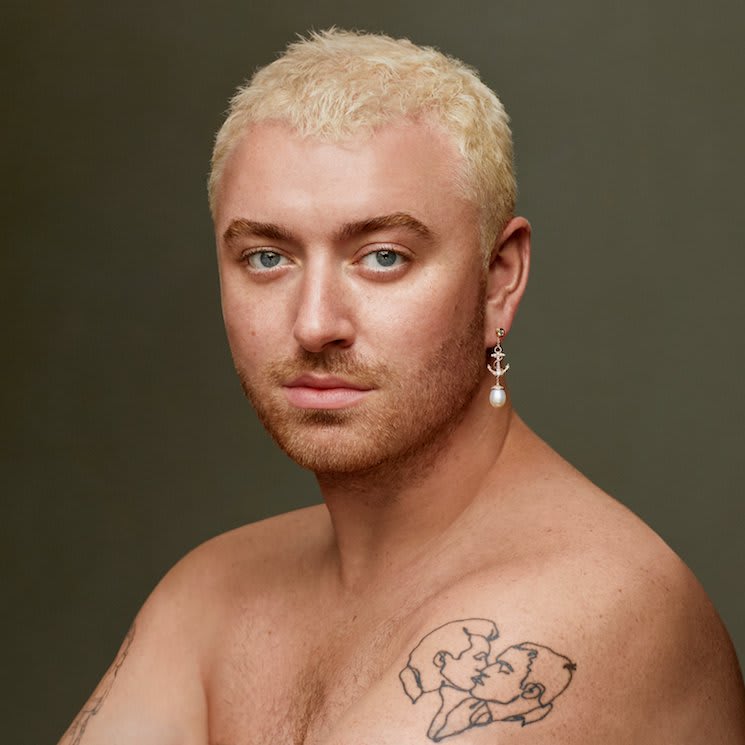Going into their fourth studio album, the bar for Sam Smith is pretty damn high. Exploding into popularity in 2014 with their debut contempo-pop missive In the Lonely Hour, Smith might be pop music's most consistent balladeer, dropping a new album with a handful of hits every three years like clockwork.
Self-described as their deepest album yet, Gloria was presented as Smith's opportunity to explore new themes and genres, as they've reached a rare point in their career where their core fans would happily welcome an experimental or deeply personal album. And though Gloria rides the line of almost being different from their other work, it doesn't quite commit to a wholly new premise or sound. It's a somewhat incoherent and disappointing listen, but only by Smith's ridiculously high standards.
The larger issue with Gloria isn't so much the music but its marketing; for all intents and purposes, Smith is just as smooth, soulful, and emotionally compelling as they've always been. But expectations change when you name your album after the glamorous, empowering voice inside your head — instead of fully committing to turning their secret diary into bombastic soft-pop anthems for the soul, Gloria is 60 percent deep-personal bops and 40 percent generic radio hits.
Fortunately, when the album does go personal, it hits hard, with Smith's lyrics on the first two tracks, "Love Me More" and "No God," specifically standing out. Backed by polished pop beats and slightly increasing kick drums, the record opens with an anxious liveliness — "Love Me More" stands as the most immediately memorable song on the album, recalling a '90s Whitney Houston ballad.
However, things go downhill from here, with Smith dipping right back into the safe and familiar on "Lose You"; an enjoyable and inoffensive vogue-lite bounce, you've already heard it a million times before. Going down the track list, things get worse. On the Jessie Reyez-featuring "Perfect," the duo attempt a moody duet only to find themselves with zero compelling chemistry, making little sense as writing or singing partners. Lyrically, the song feels lazy and not up to either of their high writing standards — the only reasonable explanation being that the song was thrown together in haste and shoehorned into the album by music execs looking to capitalize on Reyez and Smith's summer tour.
Making matters worse, Reyez appears on the album a second time with Jamaican reggae singer Koffee, as the three collaborate on the somehow-even-worse "Gimme." Lyrically obnoxious and sonically jarring, it's not a strong showing for any of the three, and would've been the most obvious choice to leave on the cutting room floor. Moving past the worst parts, Gloria does leave room for more memorable moments and ballads from Smith. On the criminally short "How to Cry," Smith once again gets personal and delivers their most emotional performance on the album. Impossible to listen to just once, it's a chilling take on the break-up anthem with just the right amount of personal reflection from Smith.
Also too short is "Six Shots," a moody neo-jazz record with an incredible vocal performance from Smith; it's the type of low-risk experiment that one might've hoped Smith would explore more thoroughly throughout the project.
Overall, Gloria seesaws between being compelling and generic, with just enough highs to keep you interested throughout. Smith is somewhat burdened by their ridiculous level of talent — with the vocal ability to make anything sound captivating, they often don't soar to the heights they're capable of.
(Capitol)Self-described as their deepest album yet, Gloria was presented as Smith's opportunity to explore new themes and genres, as they've reached a rare point in their career where their core fans would happily welcome an experimental or deeply personal album. And though Gloria rides the line of almost being different from their other work, it doesn't quite commit to a wholly new premise or sound. It's a somewhat incoherent and disappointing listen, but only by Smith's ridiculously high standards.
The larger issue with Gloria isn't so much the music but its marketing; for all intents and purposes, Smith is just as smooth, soulful, and emotionally compelling as they've always been. But expectations change when you name your album after the glamorous, empowering voice inside your head — instead of fully committing to turning their secret diary into bombastic soft-pop anthems for the soul, Gloria is 60 percent deep-personal bops and 40 percent generic radio hits.
Fortunately, when the album does go personal, it hits hard, with Smith's lyrics on the first two tracks, "Love Me More" and "No God," specifically standing out. Backed by polished pop beats and slightly increasing kick drums, the record opens with an anxious liveliness — "Love Me More" stands as the most immediately memorable song on the album, recalling a '90s Whitney Houston ballad.
However, things go downhill from here, with Smith dipping right back into the safe and familiar on "Lose You"; an enjoyable and inoffensive vogue-lite bounce, you've already heard it a million times before. Going down the track list, things get worse. On the Jessie Reyez-featuring "Perfect," the duo attempt a moody duet only to find themselves with zero compelling chemistry, making little sense as writing or singing partners. Lyrically, the song feels lazy and not up to either of their high writing standards — the only reasonable explanation being that the song was thrown together in haste and shoehorned into the album by music execs looking to capitalize on Reyez and Smith's summer tour.
Making matters worse, Reyez appears on the album a second time with Jamaican reggae singer Koffee, as the three collaborate on the somehow-even-worse "Gimme." Lyrically obnoxious and sonically jarring, it's not a strong showing for any of the three, and would've been the most obvious choice to leave on the cutting room floor. Moving past the worst parts, Gloria does leave room for more memorable moments and ballads from Smith. On the criminally short "How to Cry," Smith once again gets personal and delivers their most emotional performance on the album. Impossible to listen to just once, it's a chilling take on the break-up anthem with just the right amount of personal reflection from Smith.
Also too short is "Six Shots," a moody neo-jazz record with an incredible vocal performance from Smith; it's the type of low-risk experiment that one might've hoped Smith would explore more thoroughly throughout the project.
Overall, Gloria seesaws between being compelling and generic, with just enough highs to keep you interested throughout. Smith is somewhat burdened by their ridiculous level of talent — with the vocal ability to make anything sound captivating, they often don't soar to the heights they're capable of.




